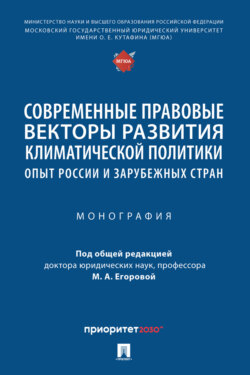Читать книгу Современные правовые векторы развития климатической политики: опыт России и зарубежных стран - Коллектив авторов, Ю. Д. Земенков, Koostaja: Ajakiri New Scientist - Страница 4
Introduction
ОглавлениеThe monograph presented to a wide scientific audience is devoted to the most topical theoretical and practical problems of legal support for climate change policy and development of legislation in the field of climate change.
Combining theoretical and practical problems in the field of climate change in one monograph is a certain novelty and difficulty in the scientific and pedagogical endeavor. At the same time, such a publication is in demand among undergraduate, graduate and postgraduate students and teachers of higher education, since there is an urgent need to accumulate academic knowledge, set and define the fundamental legal tasks in the field of climate change that are important for modern society, and to develop recommendations for their solution.
Changes penetrating many spheres of social life poses new challenges to the international professional community. The authors of the monograph consider from a comprehensive perspective legal regulation of climate policy, where the issues are its specificity, multidimensionality, integration with different branches of Russian law, which determines the complex nature of legal means of regulation of social relations connected with adaptation to climate change.
One of the most topical issues in the international community remains the environmental and climate change agenda. That is what the organizers have proposed for discussion as the theme of the Forum in 2022. In the legal regulation of ecology and environmental protection, the importance of cross-border cooperation and the use of the experience of legislators from different countries cannot be underestimated.
Now the problem of assessing and analyzing the impact of global climate problems on the transformation of law in the modern world became relevant. The issue of environmental protection is global; it requires joint efforts to find optimal, mutually acceptable variants of legal regulation to preserve our planet.
The issue is interdisciplinary and must be examined comprehensively from the various perspectives of academic researchers, as it encompasses environmental, economic, legal, and social aspects of sustainable development. This monograph discusses the preconditions for the formation of climate law as an inter-sectoral complex institution, its sources and vectors of development.
In the monograph separate attention is paid to the threats associated with global climate change, environmental security and the realization of human rights and freedoms.
Progressive movement in solving environmental problems on a global level is impossible without interest and coordinated work of representatives of each state. International cooperation through international climate diplomacy is therefore one of the issues addressed in this volume.
Today it is especially important to support research and educational cooperation in the climate policy of states, and to create working groups and expert platforms to identify emerging environmental problems and form balanced sets of measures to prevent environmental crises that affect, without exaggeration, all of humanity. Not all of the questions posed by life in the field of climate change are properly answered, but approaches to their solution must be systematically implemented, taking into account the capabilities of Russian law and the level of modern development of theory and practice.
Regards,
Head of the International Cooperation Department
of Kutafin Moscow State Law University (MSAL)
Doctor of Law, Professor
M.A. EGOROVA
